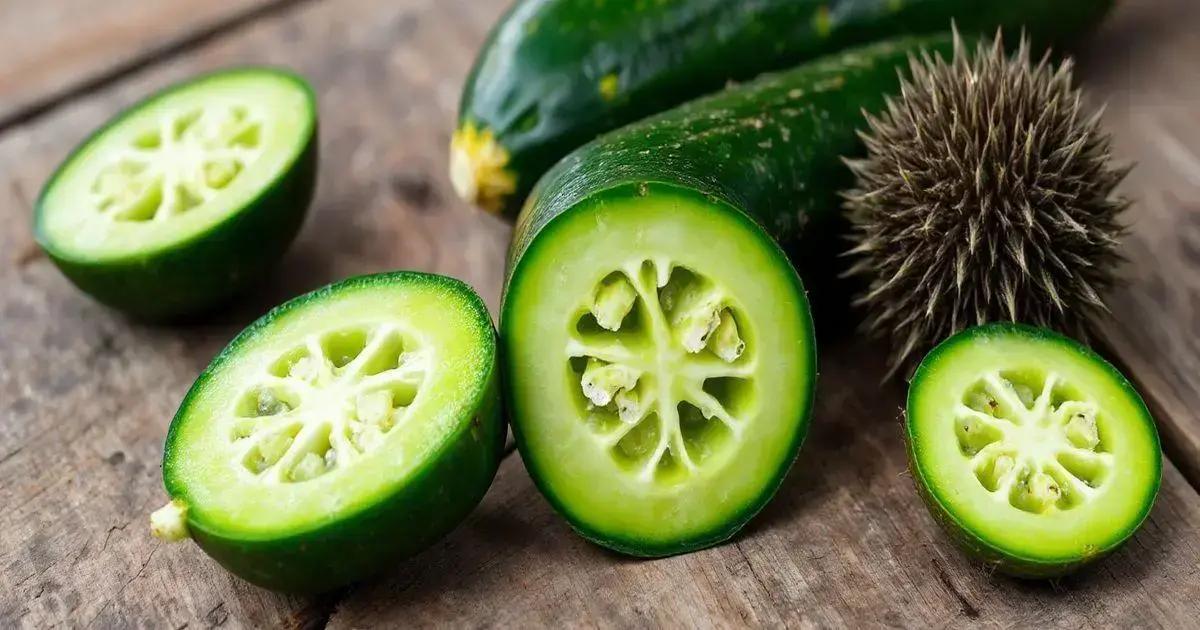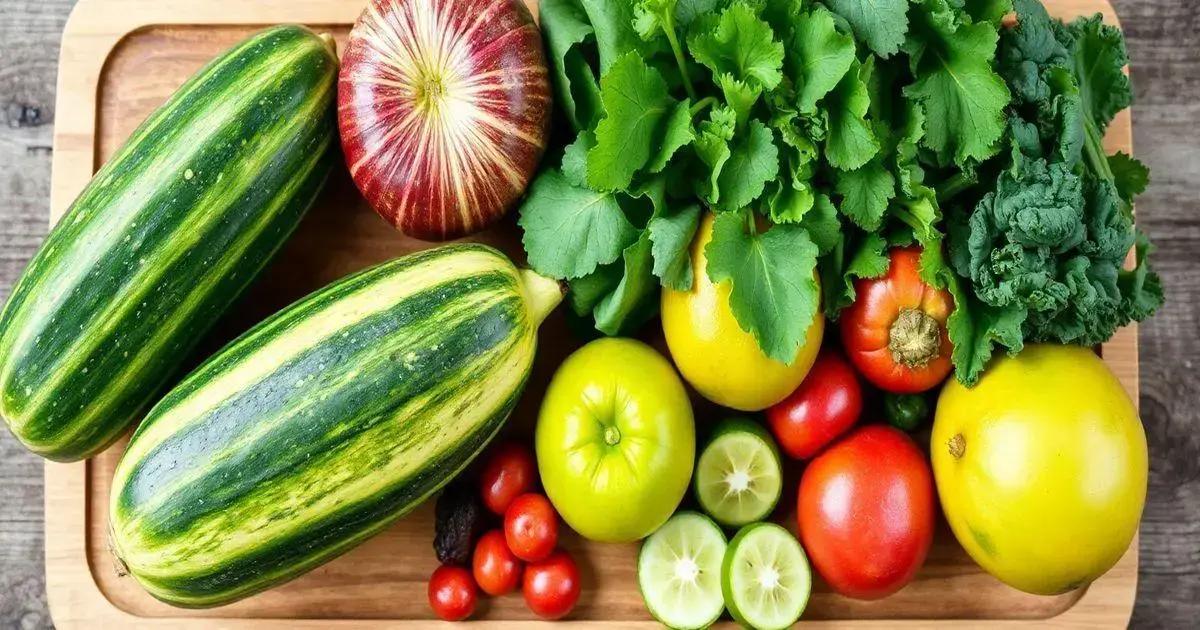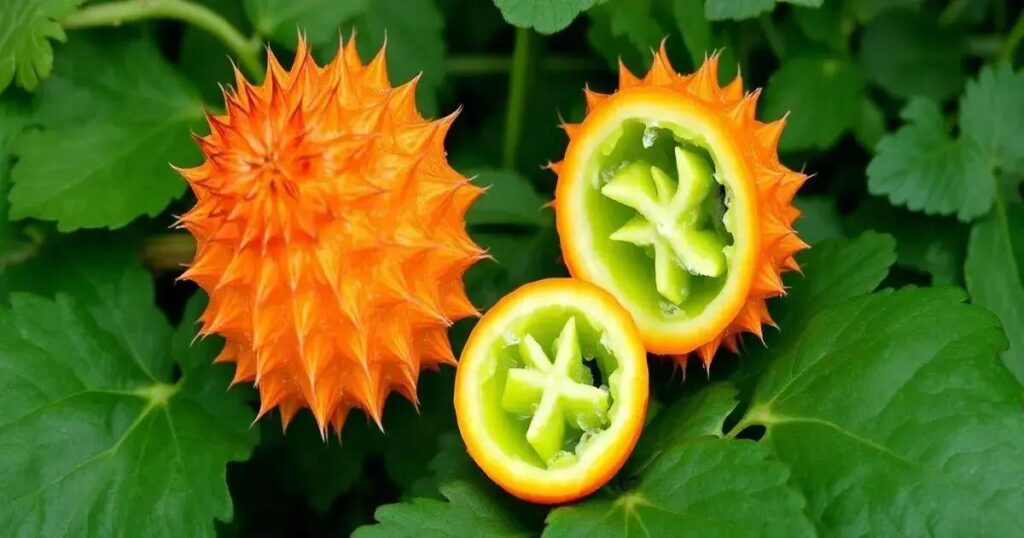African Cucumber, known as Kiwano, is a unique fruit with a spiky orange exterior and jelly-like green flesh. It is low in calories, rich in vitamins A and C, and high in dietary fiber, making it both refreshing and nutritious. This versatile fruit can be enjoyed in salads, smoothies, or as a garnish. It thrives in warm climates and requires well-drained soil and regular watering for cultivation.
Have you ever heard of African Cucumber? This intriguing fruit, also known as Kiwano, offers a unique flavor and numerous health benefits. Native to Africa, the African Cucumber has a spiky exterior and bright green, jelly-like flesh. In this article, we will explore what African Cucumber is, its nutritional benefits, culinary uses, and how it’s grown. Get ready to uncover the many secrets of this fantastic fruit!
Introduction to African Cucumber

African Cucumber, also known as Kiwano, is a unique fruit native to Africa. This fascinating specimen has a spiky orange exterior and a vibrant green, gelatinous interior. Many people recognize it for its distinct visual appeal and refreshing taste. Typically, it grows in warm climates, which makes it a popular choice in various regions across the African continent.
The flesh of the African Cucumber is both sweet and tart, lending to its versatility. Its flavor profile is often compared to that of a banana or kiwi. This fruit is not only remarkable for its taste but also contains several seeds on the inside, which add a crunchy texture when eaten.
Origins and Cultural Significance
African Cucumber is believed to have been cultivated for centuries by different African tribes. They value it as a nutritious food source as well as for its medicinal properties. In many cultures, this fruit symbolizes hospitality and summertime. Additionally, it is often used in traditional dishes, highlighting its importance in local cuisine.
Growth and Cultivation
To grow African Cucumber, farmers typically need warm and fertile soil, complemented by a good supply of water. The plant can be grown on the ground or raised with support. Due to its thriving nature, it can often yield a large crop in just a few months. Various farmers take pride in sharing this fruit at local markets, making it accessible for many to enjoy.
As the popularity of African Cucumber spreads beyond Africa, many culinary enthusiasts are looking for creative ways to include it in their dishes. Its vibrant appearance and unique texture make it a great addition to salads, desserts, and beverages.
Nutritional Benefits of African Cucumber

African Cucumber offers various nutritional benefits, making it a valuable addition to a balanced diet. It is low in calories and high in water content, which can help keep you hydrated. This fruit contains essential vitamins and minerals that support overall health.
Vitamins and Minerals
African Cucumber is rich in vitamins A and C. Vitamin A promotes good vision and supports a strong immune system, while vitamin C acts as an antioxidant to protect your cells. Additionally, this fruit is a good source of essential minerals like potassium and magnesium, which are vital for heart health and muscle function.
Dietary Fiber
This unique fruit is also high in dietary fiber. Consuming fiber aids digestion and helps maintain a healthy gut. Furthermore, it can assist in managing cholesterol levels and support steady blood sugar levels.
Antioxidant Properties
The antioxidants found in African Cucumber help combat oxidative stress in the body. These compounds play a crucial role in reducing inflammation and protecting against chronic diseases. Regular consumption of antioxidant-rich foods like African Cucumber can boost your overall well-being.
Hydration Benefits
Due to its high water content, African Cucumber is an excellent choice for hydration. Staying hydrated is essential for maintaining energy levels, supporting bodily functions, and improving physical performance.
Culinary Uses of African Cucumber

African Cucumber is a versatile fruit that can elevate many dishes due to its unique flavor and texture. Here are some popular ways to use this interesting fruit in your cooking.
Fresh Salads
One of the best ways to enjoy African Cucumber is by adding it to fresh salads. Its crunchy texture and refreshing taste pair well with greens, tomatoes, and a variety of dressings. Simply slice the fruit and toss it into your salad for a burst of flavor.
Smoothies and Juices
African Cucumber can also be blended into smoothies or juices. Its high water content makes it an ideal ingredient to add hydration and a tropical twist to your drink. Combine it with other fruits like bananas and berries for a nutritious and delicious beverage.
Desserts
This fruit can be used in desserts as well. You can scoop the flesh and mix it into yogurt or use it as a topping for cakes or tarts. Its sweet and tart flavor makes it a delightful addition to fruit salads or frozen treats.
As a Garnish
African Cucumber slices make for an attractive garnish. Use them as a topping on sushi, rice dishes, or even on meat platters. Their eye-catching appearance will impress guests and add a fun twist to your dishes.
How African Cucumber is Grown

African Cucumber thrives in warm climates, making it a popular crop in many regions of Africa. Growing this fruit involves several key steps to ensure it flourishes.
Choosing the Right Soil
Soil quality is crucial for African Cucumber. It prefers well-drained soil rich in organic matter. Before planting, farmers often test the soil to check its nutrient content. Adding compost or fertilizers can enhance growth.
Sowing Seeds
The best time to sow African Cucumber seeds is in the spring when temperatures warm up. Seeds can be planted directly into the soil or started indoors and later transplanted. They should be spaced adequately to allow for growth.
Watering and Care
The plants require regular watering, especially during dry spells. Drip irrigation is ideal since it provides consistent moisture without drowning the roots. Mulching around the plants can also help retain moisture and suppress weeds.
Pest and Disease Management
Like many crops, African Cucumber can fall prey to pests and diseases. It’s important to monitor the plants regularly. Using organic pesticides or natural methods can help control any threats without harming the environment.
Harvesting
Once the fruit matures, which usually takes about 3 to 4 months, it is ready to be harvested. Farmers usually pick African Cucumber when it turns a bright orange color. Care should be taken to avoid damaging the skin during harvest.
In Conclusion: The Unique Appeal of African Cucumber
African Cucumber, also known as Kiwano, stands out not only for its striking appearance but also for its many health benefits and diverse culinary uses. Growing this unique fruit involves careful attention to soil quality, adequate watering, and pest management, ensuring a plentiful harvest.
With its rich nutritional profile, African Cucumber is not just refreshing but also enhances meals with its distinct flavor. Whether enjoyed in salads, smoothies, or as a garnish, it brings a touch of the exotic to your kitchen.
As you explore the wonders of African Cucumber, remember its cultural roots and the thriving communities that cultivate it. Embracing this unique fruit can elevate your dining experience and contribute to a healthier lifestyle.
FAQ – Frequently Asked Questions about African Cucumber
What is African Cucumber?
African Cucumber, also known as Kiwano, is a unique fruit with a spiky orange exterior and vibrant green, jelly-like flesh.
What are the nutritional benefits of African Cucumber?
It is low in calories, high in water content, and rich in vitamins A and C, as well as dietary fiber.
How can I use African Cucumber in my cooking?
African Cucumber is versatile; it can be added to salads, blended into smoothies, used in desserts, or served as a garnish.
How is African Cucumber grown?
It requires well-drained, nutrient-rich soil, regular watering, and protection against pests. Seeds are typically sown in warm weather.
When is African Cucumber harvested?
The fruit is typically ready for harvest 3 to 4 months after planting when it turns bright orange.
Can I grow African Cucumber in my garden?
Yes, if you live in a warm climate, you can grow African Cucumber in your garden or in pots with proper care.













